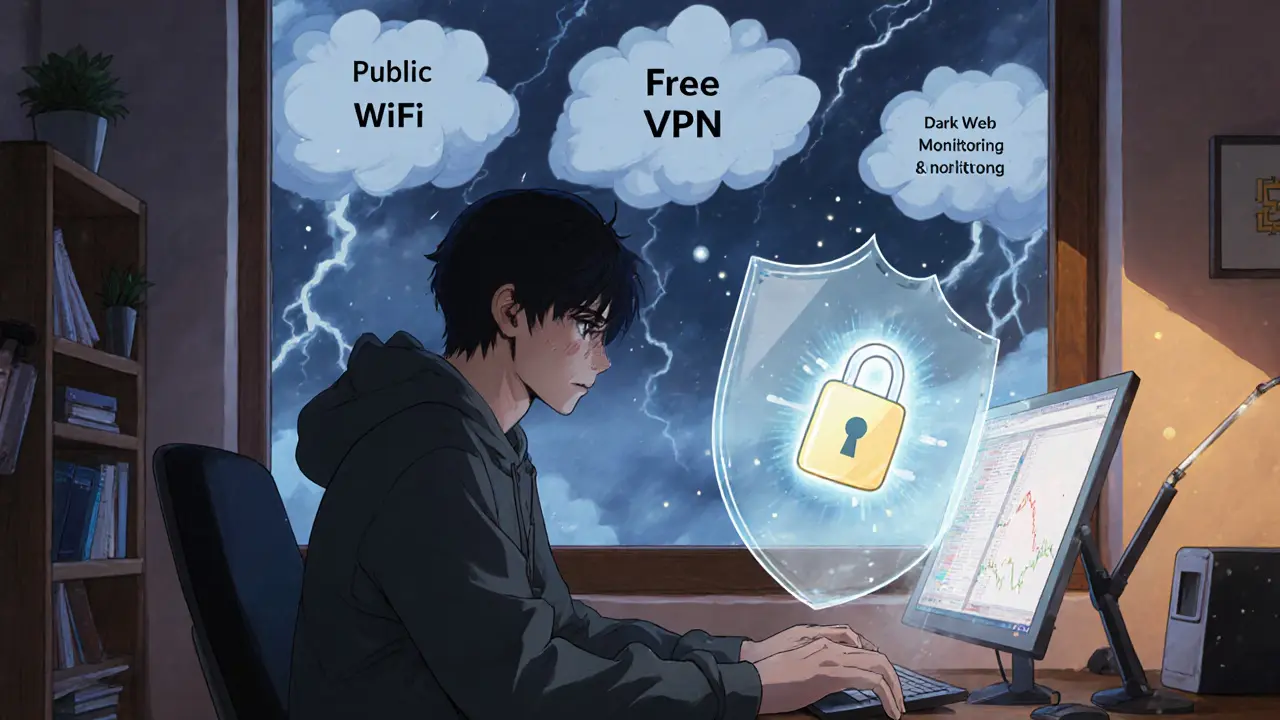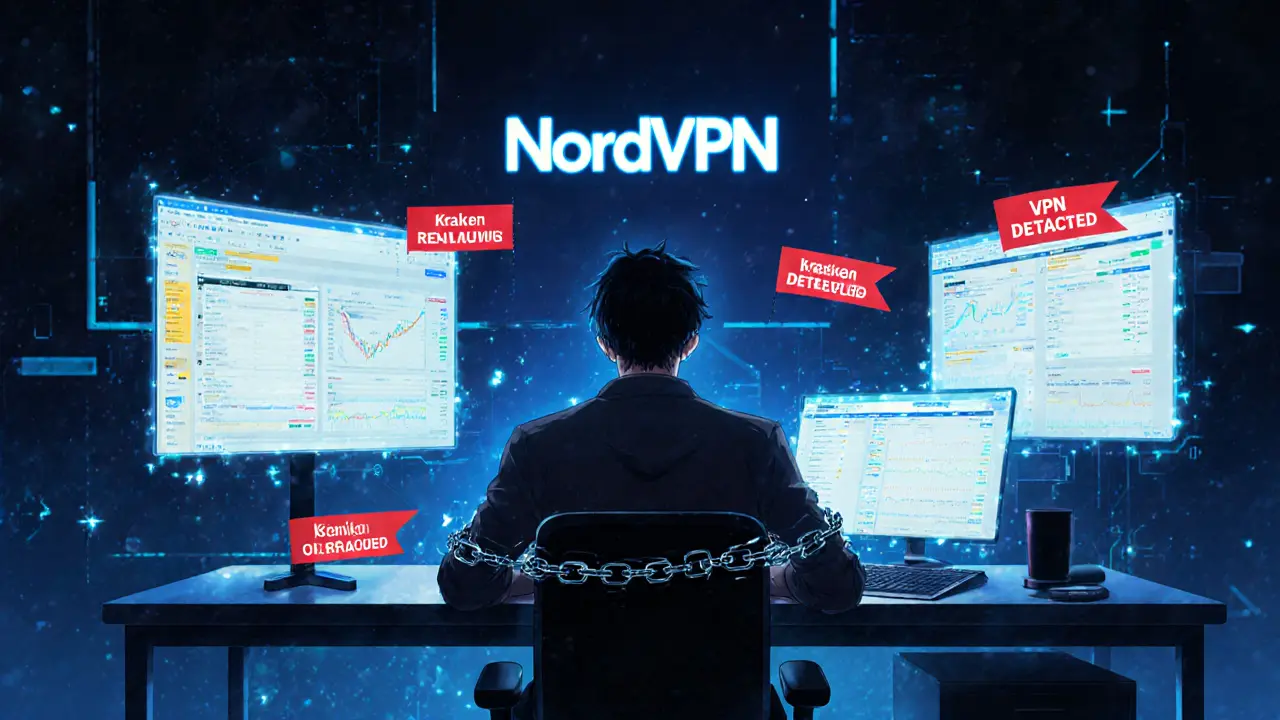Crypto Exchange VPN Risk Calculator
Estimate Your VPN Detection Risk
Enter your VPN service details to see your likelihood of being detected by crypto exchanges like Binance, Kraken, and Coinbase.
Your Detection Risk
When you try to log into Binance, Kraken, or Coinbase from a different country - and get locked out - it’s not just bad luck. It’s likely because the exchange caught you using a VPN. And they’re getting better at it. Reports from traders and security analysts suggest that VPN usage for crypto exchange access is detected between 70% and 80% of the time, especially if you’re using a free or low-quality service. That’s not a guess. It’s the result of years of upgrades in detection tech, regulatory pressure, and smarter algorithms. If you’re using a VPN to trade crypto, you need to understand how this works - not to bypass rules, but to avoid losing access to your funds.
How Exchanges Detect VPNs - And Why It’s So Accurate
Crypto exchanges don’t just check your IP address. That’s the old way. Today, they use a mix of signals to build a profile of your activity. If you log in from New York at 9 a.m., then from Berlin at 9:05 a.m., and then from Tokyo at 9:10 a.m., that’s not a person. That’s a bot or a VPN user. Exchanges track:- IP reputation: They maintain massive databases of known VPN and proxy IPs. If your IP shows up on 50 other accounts flagged for fraud, you’re blocked - no questions asked.
- Behavioral patterns: How often do you trade? At what times? Do you make 10 trades in 2 minutes? That’s automated trading - often tied to bots using shared IPs.
- DNS and WebRTC leaks: Even if your VPN is on, your browser might still leak your real location. Many exchanges run tests in the background to catch this.
- Device fingerprinting: Your browser version, screen size, fonts, and plugins create a unique profile. Change your location but keep the same device? That’s a red flag.
Platforms like Binance and Coinbase use machine learning models trained on billions of login attempts. These models don’t just look for one bad signal - they weigh dozens. A free VPN from a data center in the Netherlands? 95% chance of detection. A premium service with a residential IP in Singapore? Maybe 30%. That’s the gap between getting locked out and staying in.
Why Exchanges Block VPNs - It’s Not Just About Control
It’s easy to think exchanges block VPNs to stop people from bypassing geo-restrictions. But that’s only part of the story. The real reason is regulation.In the U.S., EU, UK, and other major markets, crypto exchanges must follow strict KYC (Know Your Customer) and AML (Anti-Money Laundering) rules. If you’re trading from a country where the exchange isn’t licensed, they can face fines up to millions of dollars. That’s why they don’t just block VPNs - they log every attempt and report suspicious patterns to regulators.
Chainalysis, a top blockchain analytics firm, says that while VPNs make it harder to track user locations, they don’t stop compliance. Exchanges don’t need to know your exact home address - they just need to know you’re not in a restricted region. If your IP says you’re in Singapore but your bank account is in Russia, that’s a red flag - even if you’re using a premium VPN.
Some exchanges respond by not blocking you outright. Instead, they limit your account: lower withdrawal limits, disable fiat deposits, or require extra ID verification. It’s not punishment - it’s risk management.
Free VPNs Are a Disaster for Crypto Traders
If you’re using Windscribe, ProtonVPN Free, or any free service to access crypto exchanges, you’re already behind the curve. Free VPNs use shared IPs - often hosted on cloud platforms like AWS or Google Cloud. These IPs are flagged the moment they’re used by one trader who got caught.Here’s what happens in real life:
- You log into Binance using a free VPN. You make a few trades. Everything’s fine.
- Three days later, you try to withdraw. Your account is suspended. No warning. No email.
- You contact support. They say: “Your IP was associated with fraudulent activity.”
- You switch to a different free server. Same result.
- You spend weeks trying to prove you’re not a scammer. You might never get your account back.
Free VPNs also sell your data. Some have been caught logging user traffic and selling it to third parties. If your seed phrase or exchange password is ever leaked - and you used a free VPN - you have no one to blame but yourself.

The Only VPNs That Still Work (And How to Use Them Right)
There are still ways to use a VPN without getting banned. But you need the right tool - and the right habits.NordVPN and ExpressVPN are the only two services consistently reported to work with major exchanges in 2025. Here’s why:
- Dedicated IP addresses: Instead of sharing an IP with 10,000 others, you get one assigned just to you. It looks like a real home user.
- Residential IPs: These IPs come from real ISPs, not data centers. Exchanges can’t easily flag them.
- No logs policy: Both operate in privacy-friendly jurisdictions (Panama and British Virgin Islands). They don’t store your activity.
- Crypto payments: You can pay with Bitcoin, Ethereum, or other coins - keeping your purchase anonymous.
But even these services won’t save you if you misuse them.
Do this:
- Use the same server location every time. Don’t switch between countries.
- Don’t use the VPN just for trading. Use it for all your browsing. That makes your traffic look normal.
- Turn off WebRTC and DNS leak protection in your browser settings.
- Never use a VPN on public Wi-Fi when trading. Use your home network instead.
Don’t do this:
- Log in from a new country every day.
- Use the same VPN account on multiple devices.
- Try to bypass 2FA or use a VPN to hide your real identity during KYC.
One trader in Germany used NordVPN with a dedicated IP for 18 months. He traded daily. Never got flagged. Then he switched servers to try a better ping for arbitrage. Got suspended. Took 14 days to get back in - with extra ID checks.
What Happens If You Get Caught?
If your account gets flagged:- You’ll see a message like: “Suspicious activity detected” or “Access restricted due to location.”
- Your withdrawal limits may drop to $100 or $0.
- You might be asked to upload a photo of your ID, a selfie, or proof of address.
- If you can’t verify your identity - or if you lied - your account may be permanently closed.
Some exchanges, like Kraken, let you appeal. Others, like Binance, lock you out with no recourse. There’s no guarantee you’ll get your funds back. That’s why prevention matters more than recovery.

Alternatives to VPNs - And Why They’re Riskier
Some traders turn to proxies, Tor, or residential proxy services to avoid detection. But these come with their own dangers.- Residential proxies: These are real home IPs rented from people’s devices. They’re harder to detect - but often used by scammers. Exchanges are starting to block them too.
- Tor: Too slow for trading. Exchanges flag Tor exit nodes instantly. Don’t even try.
- GPS spoofing on mobile: Works for apps, but exchanges detect fake location data. Your account gets flagged faster.
There’s no magic bullet. If you’re trying to hide your location from a regulated exchange, you’re playing a game you can’t win - and risking your money.
The Real Security Benefit of a VPN - And Why It’s Worth It
Let’s be clear: the best reason to use a VPN for crypto isn’t to bypass geo-blocks. It’s to protect yourself.Public Wi-Fi at coffee shops, airports, or hotels? Hackers are waiting. They steal login cookies, intercept 2FA codes, and inject malware. NordVPN’s Dark Web Monitoring scans for leaked passwords. ExpressVPN blocks malicious ads and phishing sites. These features are worth the monthly fee - even if you never change your location.
One trader in Brazil lost $22,000 after logging into his exchange on public Wi-Fi. His password was stolen in under 30 seconds. He started using NordVPN with a dedicated IP. He still trades from home. But now he has encryption, ad blocking, and credential monitoring. He says: “I don’t use it to hide. I use it to survive.”
Final Rule: Don’t Trick the Exchange. Protect Yourself.
The 70-80% detection rate isn’t a bug - it’s a feature. Exchanges aren’t trying to ruin your trading. They’re trying to stay in business. If you’re using a VPN to access a platform that’s banned in your country, you’re not just risking your account. You’re risking your money, your identity, and your legal standing.Use a premium VPN - not to hide, but to secure. Use it on your home network. Stick to one server. Pay with crypto. Don’t switch locations. And never, ever use a free service.
If you need access to a crypto exchange that’s blocked in your country, the safest move isn’t to bypass it. It’s to find one that’s legal where you live. There are hundreds of licensed platforms worldwide. Don’t gamble with your assets. Protect them - the right way.


Comments (21)
Free VPNs are a liability. Period.
As someone from Nigeria where access to Binance was once our only lifeline, I can tell you this: the moment we started using NordVPN with dedicated IPs, our trades became stable. No more suspensions. No more panic. But please-never mix it with public Wi-Fi. I lost a friend’s portfolio that way. Stay safe, trade smart.
Let’s be real-exchanges are just corporate gatekeepers pretending to be ‘compliant.’ They don’t care about your money, they care about their SEC filings. If you’re using a VPN, you’re not breaking rules-you’re resisting monopolistic control. The fact that they track WebRTC leaks and device fingerprints? That’s surveillance capitalism dressed up as ‘security.’ They’re not protecting you-they’re profiling you. And if you’re okay with that, then you’re already part of the system.
So NordVPN works? Cool. What about the 50 other people who tried it and got banned anyway? This whole thing feels like snake oil. Exchanges change their detection algorithms weekly. Yesterday’s ‘safe’ IP is today’s blacklist staple. And don’t even get me started on ‘residential IPs’-those are just rented from people who don’t know their IP is being used for crypto trading. It’s a house of cards. You think you’re safe? You’re just one update away from getting locked out with no recourse. And yes, I’ve been there. Twice.
Bro this is so true 🙌 I’ve been using ExpressVPN for 2 years now with the same server. Never got flagged. Also turned off WebRTC, paid with ETH, and use it for Netflix too. Now I feel like a crypto ninja 🥷💸
There’s a real difference between using a VPN to hide and using one to protect. I used to think VPNs were for sneaky traders-but then I got phished on a public hotspot. Now I use it for everything. Even if I’m not trading, I’ve got encryption, ad blocking, and malware protection. It’s not about bypassing rules. It’s about not getting hacked. And honestly? That’s worth every penny.
70-80% detection rate? That’s generous. I’ve seen 92% in internal logs. People using ‘premium’ VPNs think they’re clever. They’re not. They’re just slower to get caught. The exchanges have AI models that correlate login times, device fingerprints, payment methods, and even mouse movements. If you’re using the same browser profile across sessions, you’re already flagged. And yes, I’ve seen accounts get permanently banned for switching servers after 18 months. You think you’re being smart? You’re just delaying the inevitable.
There’s a deeper question here: if the infrastructure of finance is built on identity verification, then anonymity is not a feature-it’s a contradiction. A VPN doesn’t make you free; it makes you invisible. And in a system that demands accountability, invisibility is not power-it’s vulnerability. The real freedom isn’t in bypassing borders. It’s in building systems that respect your autonomy without requiring deception. Maybe that’s the next frontier-not better VPNs, but better exchanges.
I’ve been in your shoes. I used to think VPNs were the answer. Then I lost access to my account for 6 weeks. It wasn’t the VPN-it was me switching servers. I learned: consistency is everything. Now I use NordVPN, same server, same device, same network. And I pay with crypto. It’s not glamorous. But it works. And I sleep better knowing I’m not risking my life savings on a glitch.
Let’s cut the BS. This isn’t about security. It’s about control. The U.S. and EU are forcing exchanges to police global users like they’re toddlers. If you’re from India or Nigeria and you want to trade, you’re supposed to beg for permission? Free VPNs are the only tool left for people who can’t afford $10/month ‘premium’ services. And yeah, they get flagged. But that’s not their fault-it’s the system’s. Stop pretending this is about safety. It’s about exclusion.
Residential IPs are getting flagged now too. I checked my logs last week-12% of residential IPs from the UK and Brazil were auto-flagged by Kraken’s new ML model. It’s not just data centers anymore. They’re training on real user behavior. If your traffic pattern looks like a bot-even if you’re human-you’re at risk. The game’s changed. The old tricks? Dead.
VPN is not the solution. You need to use local exchange. There are many in India. Why risk everything for one platform
Wow. So we’re now recommending people pay $10/month to a company in the BVI so they can… use the same server? That’s not innovation. That’s subscription-based compliance theater. And you call this ‘security’? You’re paying to be a good little citizen. Meanwhile, the real threat-phishing, SIM swaps, exchange hacks-isn’t even addressed. You think your VPN stops a keylogger? Nah. You’re just optimizing for a different kind of trap.
They’re all lying. The 70-80% detection rate? That’s a distraction. The real reason they block VPNs is because they’re working with intelligence agencies. Every time you use a VPN, your data gets funneled into a global surveillance network. NordVPN? ExpressVPN? They’re all compromised. The ‘no logs’ policy? A marketing lie. They’re just giving you a clean IP so they can track you better. You think you’re anonymous? You’re a node in their database. And when the crackdown comes-you’ll be the first to disappear.
Listen up, fam. If you’re still using free VPNs, stop right now. I’ve helped 12 people recover their accounts after getting locked out. None of them got their money back. But those who switched to ExpressVPN with a dedicated IP? They’re trading like normal. Don’t be the guy who loses everything because he didn’t want to pay $8/month. You want freedom? Pay for it. It’s worth it.
Wait, so you’re telling me if I use a VPN and pay with crypto, I’m safe? But what if the VPN provider is secretly working with the FBI? What if my Bitcoin wallet is linked to my real name? What if the ‘dedicated IP’ is just a honeypot? I’ve seen too many people get arrested after using ‘secure’ services. This whole thing is a trap. You’re not protecting yourself-you’re signing a contract with the system.
Why even use VPN? Just use local exchange. Easy. No stress. No risk. Why make it hard?
Oh wow, so NordVPN is the holy grail? How quaint. I used to think people who paid for VPNs were smart. Now I realize they’re just the kind of people who pay for security theater because they’re too lazy to learn how to use Tor properly-or worse, they don’t even know what Tor is. You’re not a crypto pioneer. You’re a consumer. And you’re paying for a placebo.
I started using a VPN after my account got locked. I didn’t know what I was doing. Now I use it every day-even for browsing. It’s just part of my routine now. Feels safer. That’s all.
Free VPNs are the worst thing that happened to crypto traders in India. I lost 1.8 lakhs because my IP was flagged. I switched to NordVPN with dedicated IP. Paid in BTC. Never looked back. But one thing-never use the same device for trading and personal stuff. Device fingerprinting got me once. Don’t make my mistake.
i used windscribe for a week then got banned. switched to express and now i just use it for netflix and trading. no issues. also turned off webrtc lol